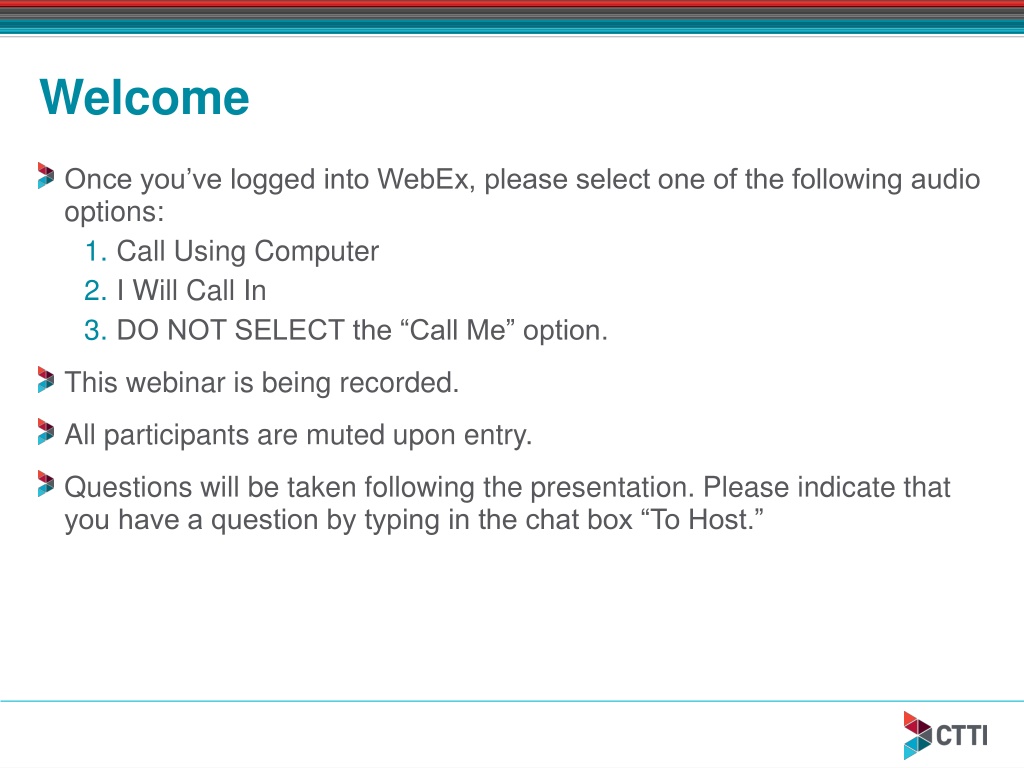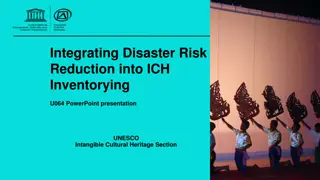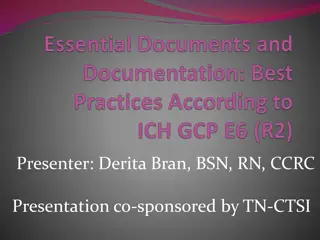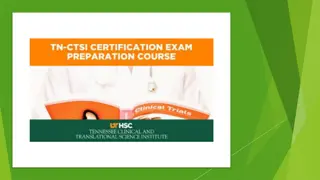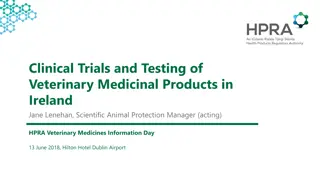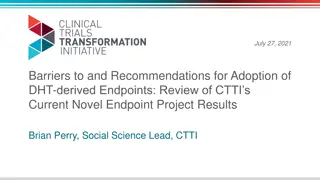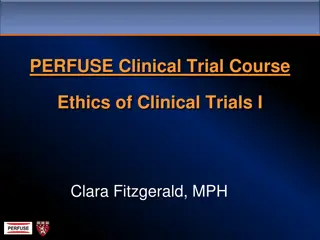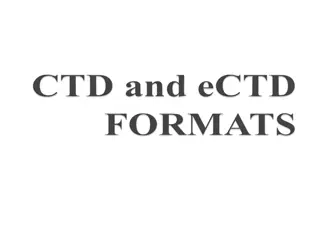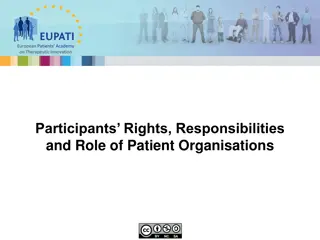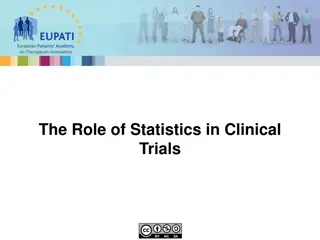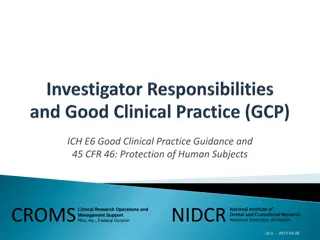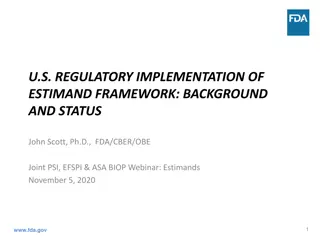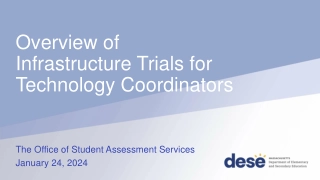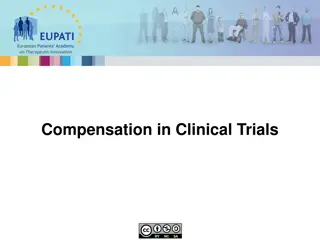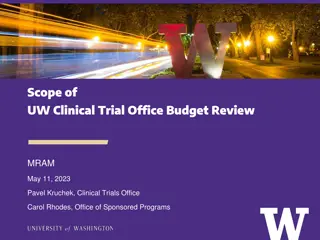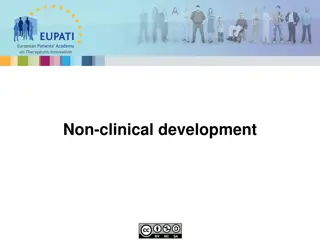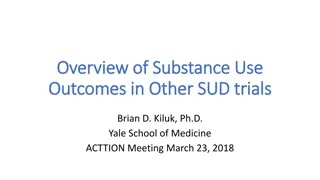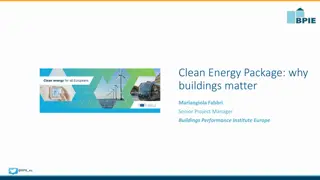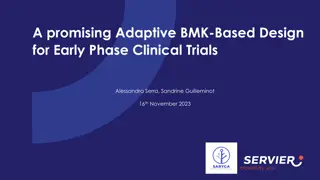Enhancing Clinical Trials through ICH E6 Renovation
Explore the Clinical Trials Transformation Initiative's efforts in updating ICH E6 guidelines to improve global clinical trials. Learn about CTTI's findings, insights from stakeholders, and discussions on the necessary updates for ICH E6. Engage with industry experts and regulatory authorities to understand the impact of the ICH-E6(R3) Good Clinical Practice standards on research outcomes.
Download Presentation

Please find below an Image/Link to download the presentation.
The content on the website is provided AS IS for your information and personal use only. It may not be sold, licensed, or shared on other websites without obtaining consent from the author. Download presentation by click this link. If you encounter any issues during the download, it is possible that the publisher has removed the file from their server.
E N D
Presentation Transcript
Welcome Once you ve logged into WebEx, please select one of the following audio options: 1. Call Using Computer 2. I Will Call In 3. DO NOT SELECT the Call Me option. This webinar is being recorded. All participants are muted upon entry. Questions will be taken following the presentation. Please indicate that you have a question by typing in the chat box To Host.
March 19, 2020 Findings & Reflections from CTTI s ICH E6 Renovation Work
Disclaimer The views and opinions expressed in this presentation are those of the individual presenter and do not necessarily reflect the views of the Clinical Trials Transformation Initiative.
CTTI Strengths Public-Private Partnership Co-founded by Duke University & FDA Involves all stakeholders Approx. 80+ members Participation of 400+ more orgs MISSION: To develop and drive adoption of practices that will increase the quality and efficiency of clinical trials
About CTTIs Work on Informing ICH E6 Renovation Inform the appropriate renovation of ICH E6 in order to support the shared goal of improving clinical trials, internationally Prior to the renovation, provide ICH with insights from stakeholders affected by ICH E6 Highlight the most essential issues and areas of greatest need for updates
Brief Agenda Time Topic Introduction: ICH and ICH E6 Renovation Presenter Fergus Sweeney Celia Witten 12:05 p.m. 12:20 p.m. Review of CTTI Findings Amy Corneli Pamela Gonzalez Dagmar Gortz 12:35 p.m. Reflection on CTTI Findings 12:45 p.m. Discussion and Q&A Pamela Tenaerts Please indicate that you have a question by typing in the chat box To Host.
Introduction to ICH Fergus Sweeney, Head, Inspections, Human Medicines Pharmacovigilence and Committees, European Medicines Agency Celia Witten, Deputy Director, Center for Biologics, US Food and Drug Administration
ICH-E6(R3) Good Clinical Practice International Council for Harmonisation of Technical Requirements for Pharmaceuticals for Human Use
E6(R3) External Outreach Outline Background on ICH Overview of GCP renovation o ICH E8 R1 revision o ICH E6 R3 revision 9
ICH guideline development steps Reflection Paper may be prepared prior to some guideline development Guideline Proposal agreed and informal WG established Concept paper and business plan adopted Formal EWG established and Step 1 consensus building commences Step 1 sign off by EWG on draft document Step 2a sign off by ICH assembly Step 2b sign off by regulators on draft document Step 3 Public consultation launched and post consultation revision Step 4 final guideline adopted by ICH Step 5 final guideline implementation and coming into force in each region 11
Background on ICH ICH Guidelines fall into four categories: o Quality o Efficacy o Safety o Multidisciplinary ICH E8 General Considerations on Clinical Studies and ICH E6 Guideline on Good Clinical Practice are both part of the E Efficacy family of guidelines 12
ICH E6 and E8 A Brief History E6: Good Clinical Practice (GCP) finalized in 1996 o Describes the responsibilities and expectations of all stakeholders in the conduct of clinical trials. o GCP covers aspects of monitoring, reporting, and archiving clinical trials o Addenda for essential documents and investigator brochures E6 (R2) finalized in 2016 o Addendum to encourage implementation of improved and more efficient approaches, while continuing to ensure human subject protections o Updated standards for electronic records 14
ICH E8 & E6 Connected Development 15
ICH Reflection on GCP Renovation Step 1: Revision to ICH E8 Goal is to address broader concerns about the principles of study design and planning for an appropriate level of data quality Provides comprehensive cross-referencing to the family of ICH guidance documents Step 2: Renovation of ICH E6 GCP Goal is to address flexibility concerns with respect to a broader range of study types and data sources Retains the current focus on good clinical investigative site practices 16
ICH E6 and E8 A Brief History E8: General Considerations for Clinical Trials -- finalized in 1997 o Sets out general scientific principles for the conduct, performance and control of clinical trials o Addresses a wide range of topics in trial design and executions o Emphasizes the protection of human subjects in clinical trials E8 (R1) Draft issued for public comment in May 2019 17
E8 Fundamental design elements Study population Intervention Control group Response variable Methods to reduce bias Statistical analysis Described in the protocol together with the study objectives, study type, and data sources which should be finalized before start of study (ICH E6) E8 clinical trial design principles E6 GCP clinical trial conduct principles 18
E8 key aspects linking to E6 Principles Quality Quality by Design Designing quality into clinical trials o Quality by design of clinical studies o Critical to Quality Factors o Risk proportionate approach o Involvement of wide range of stakeholders in clinical trial design o Examples of critical to quality factors 19
Conclusion This document focuses on designing quality into clinical studies, considering the diversity of clinical study designs and data sources used to support regulatory and other health policy decisions. The principles and approaches set out in this guideline, including those of quality by design, should inform the approach taken to the design, conduct, and reporting of clinical studies and the proportionality of control measures employed to ensure the integrity of the critical to quality factors. This is a guideline that everyone involved in the conduct of clinical trials should read and understand. The greatest challenge will be in Change Management adjusting behaviors, attitudes moving away from preconceived ideas and interests 20
E6 R3 International Council for Harmonisation of Technical Requirements for Pharmaceuticals for Human Use
E6(R3) External Outreach Overview of E6(R3) Revision - Purpose To develop a responsive GCP guideline Provide flexibility o Acknowledge the diversity of trial designs, data sources, and the different contexts in which clinical trials can be conducted o Highlight that GCP principles can be satisfied in a variety of ways 22
E6(R3) External Outreach Overview of E6(R3) Revision Approach A rewrite and reorganization of ICH-E6(R2) o Principles document and Annexes o Align with ICH-E8 as appropriate o Bridge identified gaps within E6 and between E6 and relevant ICH guidances Clear and concise scope o Expectations should be fit for purpose Focus on key concepts o Quality by design and Risk-based approach o Proportionality o Critical to quality factors o Other 23
Preliminary Conceptual Representation of the Approach Overarching principles that apply across the board Annex-1 Additional consideration s for non- traditional interventional clinical trials GCP for Interventional clinical trials Annex-2 The WG will continue to assess what should be included in Annex-1 and Annex-2 Annex-1 Reflects the concepts in E6(R2) (with updates and refinements as needed) 24
Overview of E6(R3) Revisions Annex 1 and Annex 2 Annex 1 Interventional Clinical Trials o Considers principles as they relate to the use of unapproved or approved drugs in a controlled setting with prospective allocation of treatment to participants and collection of trial data Annex 2 Non-traditional Interventional Clinical Trials o Considers principles as they relate to the use of non- traditional clinical trial designs such as pragmatic clinical trials and decentralized clinical trials, as well as those trials that incorporate real world data sources
Why are observational studiesnot included? Although certain observational studies and data are being utilized to identify safety signals, regulatory organizations are still determining how to best utilize observational studies to support decisions on efficacy. o Important issues such as determining appropriate methodologies to establish causal inference and to provide regulatory grade evidence are not fully elucidated for observational studies. o Deliberations and planning are still needed to determine best way forward Observational studies may have different considerations for the protection of human participants and for data collections compared to interventional trials. o Interventional trials prospectively apply an intervention to participants in accordance with the protocol, whereas observational studies are often retrospective in nature and do not involve an intervention. Certain elements, such GCP considerations for real-world data sources within the context of interventional clinical trials, are included under annex-2 from the current ICH-E6(R3) concept paper. The scope of Annex-2 will be further defined after Annex-1 has been developed. 26 26
Anticipated Approach Simultaneous work on the principles AND Annex-1 Step- 4 Endorsement of Concept Paper Nov - 2019 Step-1 / 2 Simultaneous work streams Principles + Annex 1 in Step-3 Principles Feedback Close Annex-2 coordination Annex 1 Develop Updated Concept Paper for Annex 2 Annex 2 reaching Step-1 Approximately 24 months Approximately 12-18 months
External Outreach There are many stakeholders impacted by ICH-E6 GCP guidelines Stakeholder outreach approaches are being considered by the EWG and ICH member organizations The knowledge gained by learning from stakeholder experiences and viewpoints will further enrich EWG discussions 28
Progress Business plan and concept paper finalized and endorsed o EWG established EWG discussions o Principles of the guidance o Scope and content of the guidance o Stakeholder engagement activities 29
E6(R3) External Outreach Thank You 30
Review of CTTI Findings Amy Corneli Social Science Lead, CTTI; Associate Professor, Department of Population Health Sciences, Duke University
Evidence Gathering Activities Online survey Qualitative, in-depth telephone interviews Open-comment platform
Purpose Identify areas of ICH E6 GCP that are and are not in need of renovation Identify a diverse group of stakeholders globally to invite for follow-up, in-depth interviews
Participants (n=327) reside in 39 countries Europe and Central Asia North America 60% 30%
Participants conduct research in 153 countries Among the participants 70% conduct research in Europe & Central Asia 52% in North America 30% in East Asia and Pacific 18% in Latin American and Caribbean 15% in sub-Saharan Africa 14% in South Asia 13% in Middle East and North Africa
Participants Organizations and Roles Represent a wide variety of organizational types 40% hospital/medical center 19% pharmaceutical biotechnology 14% commercial contract research Represent many research roles 24% investigator 20% quality assurance/quality control 17% clinical operations 14% study coordinator
Top ICH E6 GCP principles needing renovation (25% 29%) Implementing systems that assure quality 2.13 Medical care by qualified physicians/dentists 2.7 Confidentiality and privacy 2.11 Informed consent 2.9 Information documentation and storage 2.10
Sections and Topic Renovations Needing the most renovation: Section 4: Investigator Section 5: Sponsor Needing the least renovation: Section 7: Investigator Brochure Topic most frequently mentioned as needing renovation: 5.18 Monitoring (45%)
All Survey Findings CTTI has all survey findings available on the CTTI website: https://www.ctti- clinicaltrials.org/
Purpose For stakeholders to share detailed information about their experiences with implementing ICH E6 GCP and their renovation preferences What they hope the revision will achieve Most helpful aspects/sections and why Least helpful aspects/sections and why How the guidance could be improved
Participants 23 stakeholders Reside in 10 countries, primarily in Europe (57%) and North America (30%) Conduct research in 124 countries 91% in Europe and Central Asia 78% in North America 74% in East Asia and Pacific 57% in Latin American and Caribbean 57% in sub-Saharan Africa 35% in South Asia 39% in Middle East and North Africa
InterviewsResults Note: We include significant and repeated concerns expressed by participants, if even not the intended purview of ICH, so that ICH is aware of the reality of the experiences of researchers, and can consider how best to address these concerns as part of the renovation.
Aspirations Need Flexibility Simplify Make updates Be transparent and inclusive
Need Flexibility Narratives focused on: Being specific about the types of research for which ICH E6 GCP is a requirement Clarifying when ICH E6 GCP is optional Investigators select components as appropriate Providing a framework for adapting the guidance to other types of research Identifying minimum requirements of GCP necessary for different types of trials Setting quality standards that encompass non-interventional and non-drug studies
Need Flexibility Because ICH E6 GCP is viewed a global guideline, research in lower and middle-income countries need flexibility (e.g., informed consent, vulnerable populations, orphaned children)
Need Flexibility The introduction of GCP states that the principles of GCP can be, as appropriate, applied to different types of research. So this precise introductory phrase has guided, at least in Europe, authorities and ethical committees applying ICH GCP to all different types of research, which are not even involving drugs, at all. Regulatory, non-profit
Simplify Recommendation: Make ICH E6 GCP more user-friendly Simplify GCP refresher training requirements Eliminate duplicative trainings currently required by sponsors Concerns: Complexity of the guidelines disincentive for new investigators, for small single-site trials, and for investigator-initiated studies Need to transition from perception of a checklist and policing tool for audits spirit of GCP, guiding principles for research
